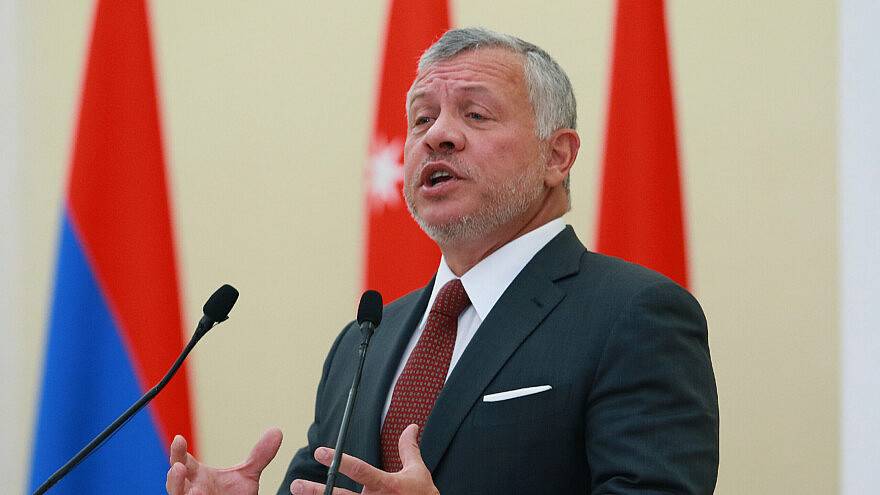by Joshua Marks
The arms were intended for the local branch of the Muslim Brotherhood to carry out sabotage and destabilize the Hashemite regime.
 |
King Abdullah II of Jordan. Photo by Gevorg Ghazaryan/Shutterstock. |
Amman thwarted a suspected Iranian-led plot to smuggle weapons into Jordan to carry out acts of sabotage and undermine the ruling Hashemite dynasty, Reuters reported on Wednesday, citing two sources familiar with the matter.
The arms were transferred from Iranian-backed militias in Syria to a cell of the Muslim Brotherhood in Jordan with links to the Hamas terrorist group in Gaza, the Palestinian offshoot of the Muslim Brotherhood currently engaged in a war with Israel following its cross-border invasion on Oct. 7.
Members of the terrorist squad—Jordanians of Palestinian descent—were arrested in late March and the cache was confiscated, the sources said.
Tehran has been trying to flood Judea and Samaria with weapons via Jordan to be used in terrorist attacks against Israelis in recent years, but this marks the first confirmed instance where the target is the kingdom itself.
The plot underscores rising concerns in Amman over efforts to destabilize the reigning dynasty led by King Abdullah II amid anger on the street over ties to Israel.
An estimated 70% of Jordan’s 12 million citizens are Palestinian. Since the Oct. 7 attack and during the ensuing war against Hamas in Gaza, there has been a surge in protests and riots outside the Israeli embassy in Amman.
However, regional observers told JNS that despite the report, the Al-Maquar compound in the capital is not in imminent danger of falling into Islamist hands, as the ruling family is aware of these threats and is taking action. But it does serve as a warning to Amman.
“The revelation of an Iranian-led plot to smuggle weapons to Islamist groups in Jordan is deeply concerning but not entirely surprising,” Dr. Ofir Winter, a senior researcher at the Institute for National Security Studies (INSS) at Tel Aviv University, told JNS.
“King Abdullah II has long been aware of the sectarian tensions in the Middle East and has previously warned about Iran’s aggressive actions,” Winter continued, noting Abdullah’s comments dating as far back as 2004 that Tehran was attempting to establish a hegemonic “Shia Crescent,” exerting its influence via terrorist proxies in Iraq, Syria, Lebanon and Yemen.
Despite its small Shia population of just 2% of the population, the kingdom is vulnerable to Iranian influence as Tehran and its regional proxies “are leveraging Sunni Islamist groups like the Muslim Brotherhood and Hamas to gain influence,” he said.
Winter continued, “Islamist groups are attempting to capitalize on the ongoing conflict in Gaza, framing it as an Islamic religious war against Israel, to restore their status in the Arab world, starting with Jordan.”
Hamas and the Muslim Brotherhood play an outsized role in Jordan and have cultivated a loyal following despite the government shuttering the Hamas offices there in 1999 and outlawing the Muslim Brotherhood in 2016 with the closing of its offices in Amman, the professor noted.
In its 2016 action, Amman transferred ownership to a splinter group called the Muslim Brotherhood Association. In 2020, Jordan’s top court dissolved the country’s branch of the Muslim Brotherhood.
Surveys demonstrate that the Muslim Brotherhood enjoys widespread support, with more than two-thirds of respondents having a positive view of the Islamist movement. At the same time, nearly half of respondents see Iran as a competitor and an enemy.
“This discrepancy underscores the complexity of Jordan’s internal dynamics and the potential for instability. The kingdom’s pro-American orientation is seen by pro-Iranian and Islamist elements as a key obstacle to their resistance efforts against Israel, given Jordan’s strategic geographic location and its long border with Israel,” Winter said.
Jordan’s security forces
Dr. Joshua Krasna, a researcher at the Moshe Dayan Center for Middle Eastern and African Studies at Tel Aviv University, said Hezbollah, the Iranian terrorist proxy in Lebanon, has also been a player in attempting to destabilize the Hashemite kingdom.
“Iran and Hezbollah have been trying to use Jordan as an active front, for attacks on Israeli targets in the kingdom but even more as a conduit for weapons and personnel into the West Bank, for decades,” Krasna, a former Israeli diplomat, told JNS. “Jordan’s security forces dedicate great efforts to uncovering and preventing these activities: it considers both Iran and Hezbollah as dangerous enemies to its internal security.”
He said he was not surprised that Iranian elements would attempt to exploit the current war to bolster Hamas in Judea and Samaria and to open up a “third front” in Jordan, with part of the outlawed Muslim Brotherhood in Jordan closely affiliated with Hamas.
“I don’t think this revelation reflects particularly on the monarchy and internal stability in general, which is challenged over the past decade by negative social and economic developments, but does not seem to be in imminent danger,” he said.
Krasna stressed the importance of Amman countering the destabilization efforts. The Jordanians have worked closely with Israel’s security apparatus over the years, but the relationship between Amman and Jerusalem has been severely tested by the current war in Gaza.
Winter said, “Jordan must continue to bolster its security measures and seek regional and international support to counter these destabilizing activities.”
Joshua Marks
Source: https://www.jns.org/jordan-thwarts-iranian-plan-to-smuggle-weapons-into-kingdom/
No comments:
Post a Comment